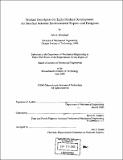Product descriptors for early product development : an interface between environmental experts and designers
Author(s)
Eisenhard, Julie L. (Julie Liberty), 1976-
DownloadFull printable version (11.62Mb)
Other Contributors
Massachusetts Institute of Technology. Dept. of Mechanical Engineering.
Advisor
David R. Wallace.
Terms of use
Metadata
Show full item recordAbstract
Sustainable development is not just about technological innovation, but rather about a radical shift in the way society thinks. The environmental effects of our choices and behavior must be internalized. In the context of product development, this internalization should occur in early product development under the guidance of an environmental expert. During early product design phases there may be numerous concepts with significant differences, detailed information is scarce, and decisions must be made quickly. The overhead in developing parametric life-cycle assessment (LCA) models for a diverse range of concepts, and the lack of detailed information make the integration of environmental expertise through traditional LCA models impractical. Therefore, a new approach was developed to incorporate analytically based environmental assessment in early design stages. Product descriptors are the communication interface between environmental experts and designers for this new model, called a learning surrogate LCA. Product descriptors are a set of keywords both understood by designers in relation to a preliminary product, and meaningful in an approximate environmental impact assessment of a product. This thesis develops a set of product concept descriptors for use in environmental assessment. The chosen descriptor set was measurable by designers in conceptual design, and produced reasonable results when used to predict environmental impacts using an approximate model. Tests within the DOME integrated modeling environment have shown it is possible to predict the life-cycle energy consumption of a product. There is also a basis for the method to be used in predicting solid material, greenhouse effect, ozone layer depletion, acidification, eutrophication, winter smog, and summer smog.
Description
Thesis (S.M.)--Massachusetts Institute of Technology, Dept. of Mechanical Engineering, 2000. Includes bibliographical references (p. 68-72).
Date issued
2000Department
Massachusetts Institute of Technology. Department of Mechanical EngineeringPublisher
Massachusetts Institute of Technology
Keywords
Mechanical Engineering.